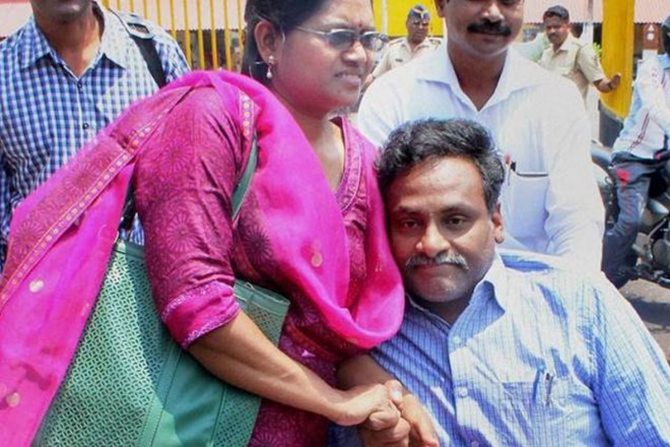The Bombay high court on Tuesday set aside the life sentence of Delhi University professor G N Saibaba in an alleged Maoist links case, noting that the prosecution failed to prove the charges beyond reasonable doubt.

A division bench of Justices Vinay Joshi and Valmiki S A Menezes of the HC's Nagpur bench overturned Saibaba's sentence terming the sanction for prosecution granted under the Unlawful Activities (Prevention) Act (UAPA) as 'null and void'.
The court said the sanction given under UAPA by the state authority was without application of mind and the report submitted by the independent authority recommending invocation of UAPA provisions in the case was 'cryptic and a laconic half page communication'.
The bench also noted that seizure of some pamphlets and electronic data from the accused merely demonstrated that they were sympathisers of the Maoist philosophy.
'Mere possession of such literature, having a particular political and social philosophy, by itself is not contemplated as an offence under the UAPA,' the HC said.
'Merely because a citizen downloads this material or even sympathises with the philosophy, would itself not be an offence unless there is specific evidence led by the prosecution to connect an active role shown by the accused with particular incidents of violence and terrorism, which would be offences within the purview of the UAPA,' it added.
The court highlighted the invalidity of the sanction procured under the UAPA, leading to the acquittal of all six accused individuals and also remarked on the trial court's verdict saying that 'violation of mandatory provisions of the law itself amounts to failure of justice'.
The Maharashtra government faced a double blow as the high court rejected its plea to stay the execution of the order saying 'stalling the order' will affect the right to personal liberty of an individual.
'We have already acquitted the accused and directed their release forthwith if not required in any other case. We cannot stall the said order, which may affect the right to personal liberty. We reject the application of stay,' the court said.
The plea was moved by Advocate General Birendra Saraf, appearing for the government, informing the bench that an appeal against the high court judgment has been filed in the apex court in the afternoon.
Saraf sought the high court to stay its judgment for a reasonable time.
The bench in its order said the report submitted in the present case by the authority granting sanction to prosecute the accused under UAPA 'displays total non-application of mind' to the material on record.
A cryptic report was sent by the independent authority and such a 'cryptic communication cannot be considered as a report under law', the court said.
'The laconic half page communication cannot be called a report since there is no material found therein to infer that the authority has reviewed the evidence gathered and formed a particular opinion on that basis,' the court said.
The high court order was almost similar to the earlier October 14, 2022, order of a different bench which had acquitted Saibaba noting that the trial proceedings were 'null and void' in the absence of a valid sanction under the UAPA.
However, the 2022 judgment was stayed by the Supreme Court and was remanded back to HC for a fresh hearing.
In its detailed judgment on Tuesday, the HC bench led by Justice Joshi declared the prosecution's actions as flawed, stating a lack of evidence and legal seizure against the accused.
'The entire prosecution is vitiated on account of invalid sanction to prosecute all the accused. The trial held despite the violation of mandatory provisions of the law itself amounts to the failure of justice,' the HC said.
Saibaba, who has been wheelchair-bound due to physical disability, has been lodged in the Nagpur Central Jail since his arrest in 2014.
'The prosecution has failed to prove beyond reasonable doubt the case against the accused persons,' the court said, adding that 'the prosecution has failed to establish any legal seizure or any incriminating material against the accused'.
'The trial court judgment is not sustainable in the hands of law. We, therefore, allow the appeals and set aside the impugned judgment. All the accused stand acquitted,' the bench said.
In March 2017, a sessions court in Maharashtra's Gadchiroli district convicted Saibaba and five others, including a journalist and a Jawaharlal Nehru University (JNU) student, for alleged Maoist links and indulging in activities amounting to waging war against the country.
The trial court had held Saibaba and others guilty under various provisions of the UAPA and the Indian Penal Code.










